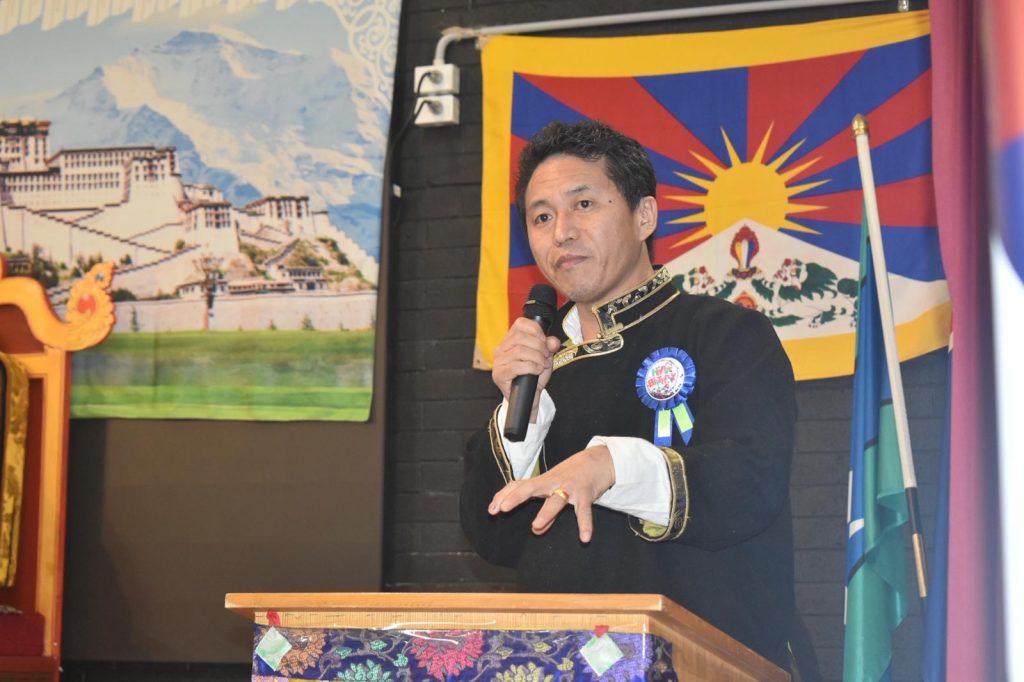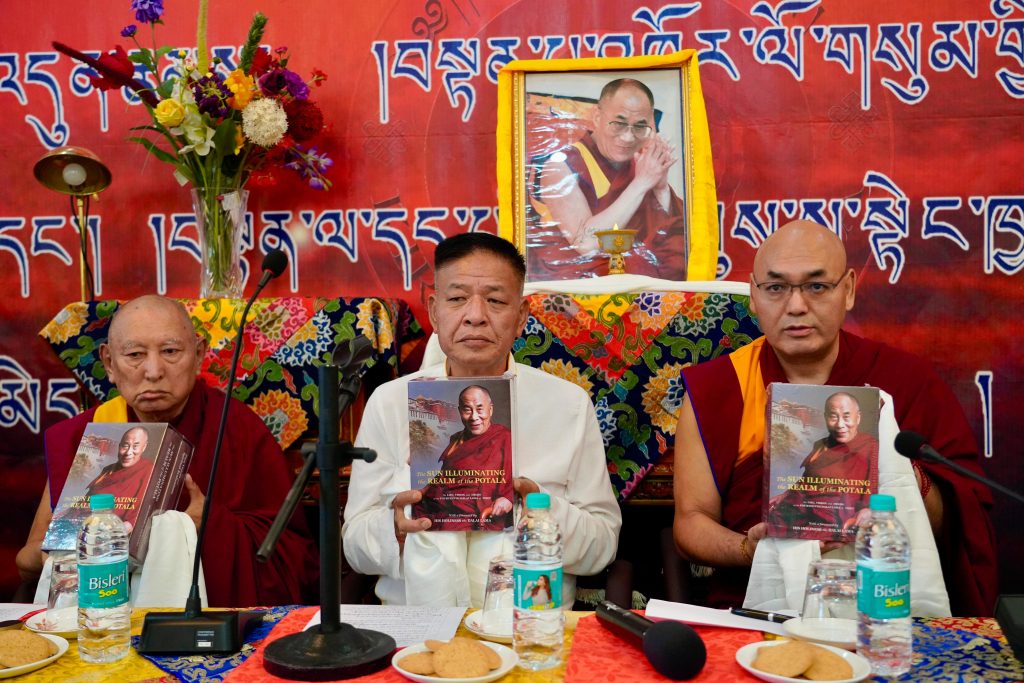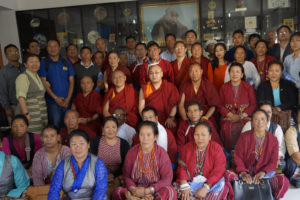
Dharamsala: The Patyatris, of around 50 people from Tawang and West Kameng district of Arunachal Pradesh, who participated in padyatra (pilgriamge on foot) from Chuthangmo, Tawang to Tezpur, Assam to mark the 60th year of His Holiness’ arrival in India, visited the Tibetan Parliament-in-Exile at 9:30 am on 2 April, 2018.
Guru Tulku, former head abbot (khenpo) of Tawang monastery, Mrs Rinchen Dolma, mother of present Chief Minister of Arunachal Pradesh Shri Pema Khandu and Lhundup Choesang, Chairman of Tawang Core Committee members were among the leaders of the padyatra, who visited the Tibetan Parliament-in-Exile.
They were greeted in the ‘Conference room cum Library’ by the Speaker Ven. Khenpo Sonam Tenphel and the Deputy Speaker Ven. Acharya Yeshi Phunstok of the Tibetan Parlaiment.
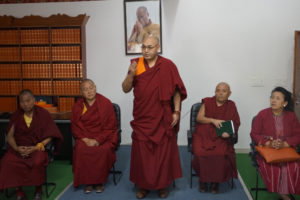
Speaker Ven. Khenpo Sonam Tenphel greeted the padyatris with heartfelt appreciation for the visit and stated, ‘It is now 60 years since we came into exile. Looking back at history, India and Tibet has been living as neighbour, sharing close bond for thousands of year and becoming trust-worthy friends with each other. In particular, the birth place of the sixth His Holiness the Dalai Lama in India has become an integral holy land within the mindset of Tibetan people.’
Expressing his gratitude for the peace-march in solidarity with the Tibetans, he said, ‘In state like Arunchal Pradesh, the culture, religion and even language between the locals and Tibetans settled there are almost same. Earlier on Dec 2017, when i visited Tezu, Chief Minister Sh. Pema Khandru, delivered a speech which was filled with concern towards the Tibetan issues and was especially enthusiatic towards the welfare of the Tibetan and their comminuty within the state. So, I would like pass my heartful gratitude him via his mother Mrs Rinchen Dolma, who is present here today.’
‘As stated in yesterday’s “Thank-you India’ program, on one side the fact that Tibetans are forced into exile is tragic, yet on the other side, by the grace of His Holiness the Dalai Lama and requisite facilitations by both the center and states of India, Tibetan culture, religion and language could be revived and nourished and the exiled Tibetan community could be identified distinctively in the world. Nowadays, the principal issue of Tibet, its religion and culutre are being paid special attention. As His Holiness always advocates that Tibet’s distinctive religion has the capability in contributing to a more peaceful world. Numerous scientists and scholars pay extra attention to the Tibetan Buddhism. Tibetan Buddhism shares the same ancestral heritage with India, thus, these are our shared culture. From Khunu Rinpoche in Himalaya region to other holy lamas, many high lamas have born in India. Even today, revered spiritual leaders like the former Ganden Tripa, Rizong Rinpoche, works tirelessly to contribute exceptional benefits towards the Buddhist Dharma. Therefore, it is highly important to preserve and promote our common culture and religion, for it has all the capabity to help not only our communities but also others as well. In that respect. His Holiness the Dalai Lama has often call it as the ‘universal gem of the world.’ In conclusion, I wish to extend my pleasure at having you all here and also my heartfelt gratitude on behalf of the Tibetan Parlaiment-in-Exile. By the blessing of supreme and pure intention generated by this march, May His Holinesss the Dalai Lama be able to return to Potal Palace in all spontaneity. And may I request you all to pray for speedy resolvement of Tibet’s issue and the reunification of all the Tibetans in Tibet,’ addressed the Tibetan Speaker.
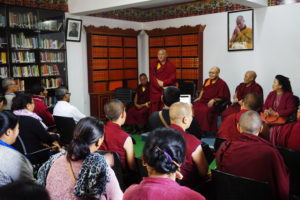
Thereafter, Guru Tulku, the former head abbot (khenpo) of Tawang monastery expressed how touched and overwhelmed he was at the reception of him and other members of the padyatra by Samyeling Tibetan Settlement office, along with various organisations at Delhi as well as at the Kangra airport, Gagal by the representatives of Central Tibetan Administration and various organisitions. In particular, he stated that the audience with His Holiness the Dalai Lama is an auspicious and an unforgettable moment in his life. He also expressed his pleasure and gratitude for being exposed to new experiences as well as to various methods and modes in resolving Tibet’s issue, especially on being able to visit the Tibetan Parliament-in-Exile and meet its members, which he stated was extremely gratifying.
‘Keeping in our heart His Holiness the Dalai Lama’s advice to the people of Himalayan region, who share the same Tibetan culture and religious heritage, that it is also our responsibly to help in the survival of Tibetan Buddhist culture, we have worked tirelessly to prevail the just cause of Tibet from Ladakh to Arunachal Pradesh. We constantly feel and remind ourselves that there are lot more left to do than what has been done. We will always comply with the guidance of His Holiness the Dalai Lama. Do divulge us in ways we could assist whenever necessary, for we would do our best of capabilities in assisting the just cause of Tibet. I feel that the Central Tibetan Administration should work harder to resolve the Tibet’s issue, however, I also feel that there are lots of unforeseen complications which causes setback. At such times, I wish you all would persevere and endure through such predicaments.’
Speaking on the significant of His Holiness the Dalai Lama to the people of Himalayan region, he further stated, ‘One can never measure how valuable His Holiness the Dalai Lama is to the people of Himalaya region. After coming into exile, His Holiness the Dalai Lama has held innumerable religious ceremonies in Himalayan region, broadening the horizon of Buddhism comprehension and knowledge among its people. It is very clear that there is karmic connection between us and His Holiness the Dalai Lama. Just as His Holiness the Dalai Lama is the refuge of Tibetan people, HE is also the refuge of Himalayan people as is evident from our history, shastra, prophetic scripture etc. Therefore, our unchanging and unadulterated faith and belief in HIM is very firm and unassailable. And we will always do our utmost to fulfill the wishes and aspirations of His Holiness the Dalai Lama in resolving the Tibet’s issue.’
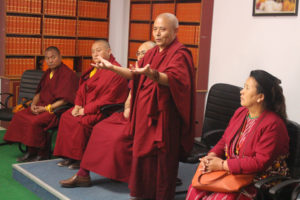
After that, Deputy Speaker Ven. Acharya Yeshi Phuntsok greeted the members and expressed his gratitude stating, ‘Mahatma Gandhi has carried out over 198 non-violent campaigns for Indian freedom movement. Similarly the former President of South Africa Nelson Mandela and Martin Luther King Jr. has carried out innumerable campaigns for the sake of the freedom of their people. Under the leadership of His Holiness the Dalai Lama, the struggle for the just cause of Tibet is being carried both inside and outside Tibet. Today, you all have participated in the peaceful march from Chuthangmo, Tawang to Tezpur, Assam for 11 days, which in itself is a very historical moment. Furthermore, it is also an advocacy of Tibet’s history. I would like to thank you all for sparing your precious time and energy by participating in such campaigns to raise awareness about Tibet as well as for your firm faith and respect in His Holiness the Dalai Lama.’Tibetans, both inside and outside Tibet are aware of padyatra campaigns that you all have pariticaped in. As said in the program of ‘Thank-you India’ day on 31st March at the Main Dalai Lama Temple, Mcleod Ganj, by a dignitary, life of a refugee is indeed the hardest. The richest refugees is still poorer than a poorest beggar, for he is without any state to call his own.’
Calling on the members of the padyatra, he said, ‘Basically people from all over the world come to Dharamsala to get an audience with His Holiness the Dalai Lama and visit the Central Tibetan Administration,Tibetan Parlaiment-in-Exile, Library of Tibetan Work and Archive, Tibetan Medical and Astrology institute, Schools etc. However, they return to their respective countries with an ever more motivation to work for the cause of Tibet after becoming more aware of the Tibetan struggle movement. Thus, similarly, I wish to entreat you all to disseminate among your local people and the state legislatures the facts of Tibet’s history and obtain more support for the just cause of Tibet, in particularly to help facilitate the Tibetan settled in your states. If you could entreat your representatives to table Tibet’s issues in the parliamentary session, it would be particularly beneficial for our struggle movement. For instance in France, members of France Tibet support group vote for their representative if they assure them of raising Tibet’s issue before the table of their parliamentary sessions. As His Holiness often says, we do not harbor any ill-will against the general Chinese populace, for they themselves are unable to put forward their opinion before their government. We neither promote anti-Chinese sentiments nor pro-Tibet sentiments, we only seek your support based on Tibet’s historical facts and reality. Tibetans as young as 15 years old, who has never seen Mao, Deng and other Chinese leaders yet knowing that they aren’t the true leaders of Tibet, had engaged in acts of self-immolations solely for the preservation of Tibet’s unique culture, religion and freedom. Knowing that we are striving for autonomy based on the Middle way approach, I request you all to support Tibetan struggle movement, rationally and realistically.’
He then elaborated on the difference between Indian parliamentary session and Tibetan parliamentary session despite their common ground on its proceedings, ie., the content of the proceeding. He stated that in two sessions held in Tibetan parliamentary each year, the sustainability and mobility of Tibetan struggle movement, advocating Tibet’s issue on international platforms as well as liaising with various governments, parliaments and NGOs to garner more support are discussed. And that the budget is allocated in relation to that aspect.
He also elucidated them on the composition of the Tibetan Parlaiment-in-Exile, which he said represents the Tibetans from the traditional three provinces in Tibet, different schools of religion, Europe, America and Australasia. He also informed them on the various committees as allocated among the members of the Tibetan Parliament, including the standing committee as well as the their functions. He also informed them on the Green Book and Blue Book as issued by the Department of Finance, CTA. He stated that people from different countries contribute to the financial aids to support Tibetan cause via the Blue Book, regardless of any amount of contribution. He concluded his speech by expressing his hope for more such campaigns and activities in the future.
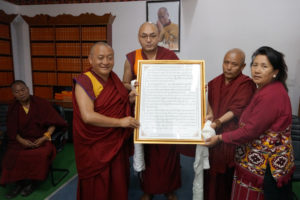
Afterwards, former head abbot (khenpo) of Tawang monastery, Guru Tulku and Mrs Rinchen Dolma, mother of present Chief Minister of Arunachal Pradesh Shri Pema Khandu presented souvenir to the Speaker Ven. Khenpo Sonam Tenphel, who in turn, offered khatak (Tibetan ceremonial scarf) and mementos to all guests in a gesture of his appreciation on behalf of Tibetan Parlaiment-in-Exile and Tibetan, both inside and outside Tibet.
